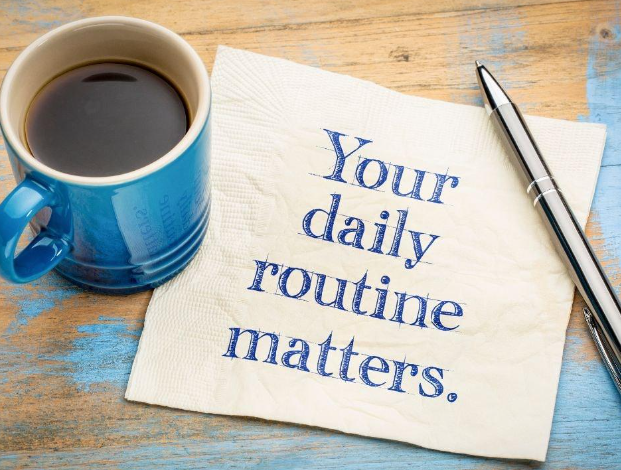How to Create a New Daily Routine to Support Sobriety

Creating a new daily routine is a crucial step in supporting sobriety. It involves more than just eliminating alcohol or drugs from your life; it requires a comprehensive approach to developing healthy habits and maintaining physical and mental health.
Here’s a guide to help you design a daily routine that supports your recovery journey and fosters a healthier, sober lifestyle.
Establishing a Healthy Daily Routine
A structured new routine is vital for those in recovery. It provides a sense of stability and purpose, reducing the likelihood of falling back into old, unhealthy habits. Additionally, a well-planned daily routine helps maintain a balanced lifestyle, fostering long-term success in sobriety. Here’s how to build a healthy daily routine:
Morning Routine
- Wake Up Early: Aim to wake up at the same time each day to regulate your body’s internal clock. This consistency can enhance your sleep quality, leading to more energy and better focus throughout the day.
- Practice Self-Care: Engage in activities that promote well-being, such as meditation, journaling, or a warm shower. Starting your day with self-care can set a positive tone and reinforce your commitment to a healthier life.
- Healthy Breakfast: Start your day with a nutritious meal to boost your energy levels and metabolism. Including a balance of protein, healthy fats, and carbohydrates can keep you satiated and prevent mid-morning cravings.
Daytime Activities
- Exercise Regularly: Incorporate physical activities like strength training, yoga, or a brisk walk to improve your physical and mental health. Regular exercise can also reduce stress and improve your mood, making it easier to handle daily challenges.
- Structured Work or Hobbies: Engage in productive activities or hobbies that bring joy and a sense of accomplishment. Finding a purpose in your day can enhance your self-esteem and provide a positive distraction from cravings or negative thoughts.
- Balanced Meals: Plan for healthy meals throughout the day to maintain energy levels and avoid cravings. Preparing balanced meals in advance can help you stick to your healthy eating plan and support your recovery goals.
Evening Routine
- Wind Down: Reduce blue light exposure by limiting screen time before bed. Engage in relaxing activities like reading or listening to calming music. Establishing a calming evening routine can help you fall asleep faster and enjoy deeper rest.
- Reflect on Your Day: Take a few minutes to reflect on your achievements and areas for improvement. This practice can help you stay mindful of your progress and identify patterns that support or hinder your sobriety.
- Prepare for the Next Day: Organize your to-do list and set your goals for the next day. Planning ahead can reduce morning stress and give you a clear focus, helping you to start the day with purpose and direction.
By implementing these steps into your daily routine, you can build a solid foundation for maintaining sobriety and leading a fulfilling, healthier life, free from drug and alcohol addiction.
Supporting Physical and Mental Health
Maintaining both physical and mental health is essential in the recovery process. The Substance Abuse and Mental Health Services Administration (SAMHSA) emphasizes the need for integrated care that addresses both aspects. Here’s how you can support your overall well-being:
Regular Exercise
Engaging in physical activities helps improve mood, reduce stress, and enhance overall health. Aim for at least 30 minutes of moderate exercise most days of the week. Incorporating activities you enjoy, such as walking, cycling, or dancing, can make exercise a fun and sustainable part of your daily routine.
Adequate Sleep
Ensure you get enough sleep to restore your body and mind. Aim for 7-9 hours of sleep each night. Establishing a consistent bedtime routine, including winding down with calming activities, helping you fall asleep quicker and can significantly improve the quality of your sleep.
Healthy Eating Habits
Fuel your body with nutritious foods. Incorporate a variety of fruits, vegetables, lean proteins, and whole grains into your diet. Planning and preparing your meals ahead of time can help ensure you make healthy food choices, even on busy days.
Substance Abuse and Mental Health Services Administration Encourages You to Seek Help When You Need It
Seek professional help from a drug rehab center, if needed. Drug and alcohol addiction treatment and mental health services can provide therapy, support groups, and other resources to help you manage stress and emotions. Don’t hesitate to reach out to these resources, as they can offer crucial support and guidance throughout your recovery journey.
Emotional Health
Practice mindfulness, meditation, or other relaxation techniques to maintain emotional balance and resilience. Taking just a few minutes each day to practice deep breathing or mindful meditation can greatly enhance your emotional well-being and help you stay grounded.
Building Healthy Habits
Creating and maintaining healthy habits is a continuous process. Here are some strategies to help you develop and sustain these habits:
- Start Small: Focus on making one change at a time, such as swapping sugary snacks for healthier options or adding a morning stretch routine. These small adjustments can gradually lead to bigger lifestyle improvements without overwhelming you.
- Be Consistent: Consistency is key to forming new habits; whether it’s drinking more water or practicing gratitude daily, stick with it to see lasting results. Over time, these consistent efforts will become ingrained in your daily routine, even outside of addiction treatment.
- Track Your Progress: Keep a journal or use an app to monitor your progress in areas like exercise frequency or emotional well-being, and celebrate each milestone along the way. Reflecting on your achievements can boost motivation and reinforce positive habits.
- Stay Flexible: Life is unpredictable, so adapt your routine as needed, like finding alternative workout times or adjusting meal plans, while keeping your overall health goals in mind. Embracing flexibility allows you to navigate challenges while staying committed to your journey towards sobriety and well-being.
Overcoming Challenges in Early Recovery
Early recovery can be a challenging period. Here are some tips to help you navigate this phase:
- Avoid Triggers: Identify and avoid situations or environments that may tempt you to use alcohol or drugs. This might involve changing your social circle, avoiding certain places, or finding alternative activities.
- Seek Support: Surround yourself with a supportive network of friends, family, and recovery groups who understand your journey and can provide encouragement and accountability.
- Practice Self-Compassion: Be kind to yourself and acknowledge that recovery is a journey with ups and downs. Understand that setbacks are a normal part of the process, and use them as opportunities for growth and learning.
- Stay Busy: Keep your mind and body occupied with positive activities such as hobbies, exercise, or volunteering. This not only helps distract from cravings but also enhances your sense of purpose and fulfillment in your sober life.
Celebrating a Sober Day
Each sober day is a milestone in your recovery journey. National Sober Day, celebrated on September 14th, serves as a powerful reminder of the importance and value of living a sober life. Embracing this day and incorporating daily activities that support sobriety can significantly reinforce your commitment and celebrate your progress.
Daily Affirmations and Intentions
Start your morning by acknowledging your progress and setting a positive intention for the day. This could be a simple affirmation like, “I am strong, and I am committed to my sobriety,” or a specific goal such as, “Today, I will focus on staying present and grateful.” Daily affirmations can strengthen your resolve and keep your mind focused on your recovery goals.
Reflect on Your Journey
Take time each day to reflect on your journey and the milestones you have achieved. Whether it’s a few days, months, or years of sobriety, acknowledging your efforts and progress can be incredibly empowering. Journaling about your experiences, challenges, and triumphs can provide a deeper sense of self-awareness and appreciation for your sober life.
Create a Daily Ritual
Incorporate rituals into your routine that symbolize your commitment to sobriety. This could be lighting a candle, taking a mindful walk, or practicing meditation. Such rituals can serve as daily reminders of your dedication to a sober lifestyle and provide moments of peace and reflection.
Engage in Sober Celebrations
Celebrate each sober day with activities that reinforce your healthy, substance-free lifestyle. This could involve spending time with loved ones, engaging in a favorite hobby, or treating yourself to a special outing or meal. By associating positive experiences with sobriety, you can create joyful memories that strengthen your resolve.
Connect with the Sober Community
Engage with the sober community, especially on National Sober Day. Participate in local or online events, share your story, and support others on their recovery journeys. Building connections with others who understand and share your commitment to sobriety can provide valuable support and encouragement.
Practice Gratitude
Each day, take a moment to express gratitude for the positive aspects of your sober life. This could be as simple as being thankful for improved health, stronger relationships, or the personal growth you’ve experienced. Practicing gratitude can shift your focus towards the positives of your sober journey and enhance your overall well-being.
Look Forward to the Future
Use each sober day as an opportunity to look forward to the future with hope and optimism. Set long-term goals and dream about the possibilities that a sober life opens up for you. Whether it’s pursuing a new career, traveling, or deepening your relationships, envisioning a bright future can keep you motivated and focused on your recovery.
Celebrating each sober day, and particularly National Sober Day, is a vital part of maintaining your commitment to sobriety. By integrating positive affirmations, daily rituals, reflections, and celebrations into your routine, you can continually reinforce the value of a sober life. Remember, every day without alcohol or drugs is a victory and a testament to your strength and resilience on your recovery journey.
Embracing a Sober Lifestyle
A sober lifestyle is about more than just abstaining from substances and alcohol consumption. It’s about creating a fulfilling and meaningful life. Here’s how you can embrace and enjoy a life free from the throws of drug and alcohol addiction:
Explore New Interests
Try new hobbies or activities that excite you. This can include learning a new skill, volunteering, or pursuing creative projects. Engaging in these activities not only keeps you busy but also helps you discover passions and talents you may not have realized before.
Build Healthy Relationships
Cultivate relationships with people who support your sobriety and encourage your growth. Surrounding yourself with positive influences can provide the emotional support and encouragement needed to stay on your recovery path. Seek out social groups or communities that share your interests and values.
Focus on Self- Improvement
Set personal goals and work towards them. This can be related to your career, education, or personal development. Continuous self-improvement can enhance your self-esteem and give you a sense of accomplishment, further reinforcing your commitment to a life free from substance abuse.
Celebrate Your Sober Life
Take pride in your sobriety and the positive changes it brings to your life. Celebrate your milestones and acknowledge your hard work. Whether it’s a month, a year, or more, recognizing your achievements can boost your motivation and remind you of the benefits of a sober lifestyle. Consider treating yourself to something special or sharing your successes with loved ones. Every sober day is a win!
How to Structure Your New Healthy Routine to Help You Remain Sober
Creating a new daily routine to support sobriety is a powerful step towards a healthier and happier life, free from the clutches of alcohol use disorder. By focusing on building healthy habits, maintaining physical and mental health, and embracing a alcohol addiction-free life, you can navigate your recovery journey with confidence and resilience. Remember, each sober day is a victory, and with each step, you’re building a brighter future.





